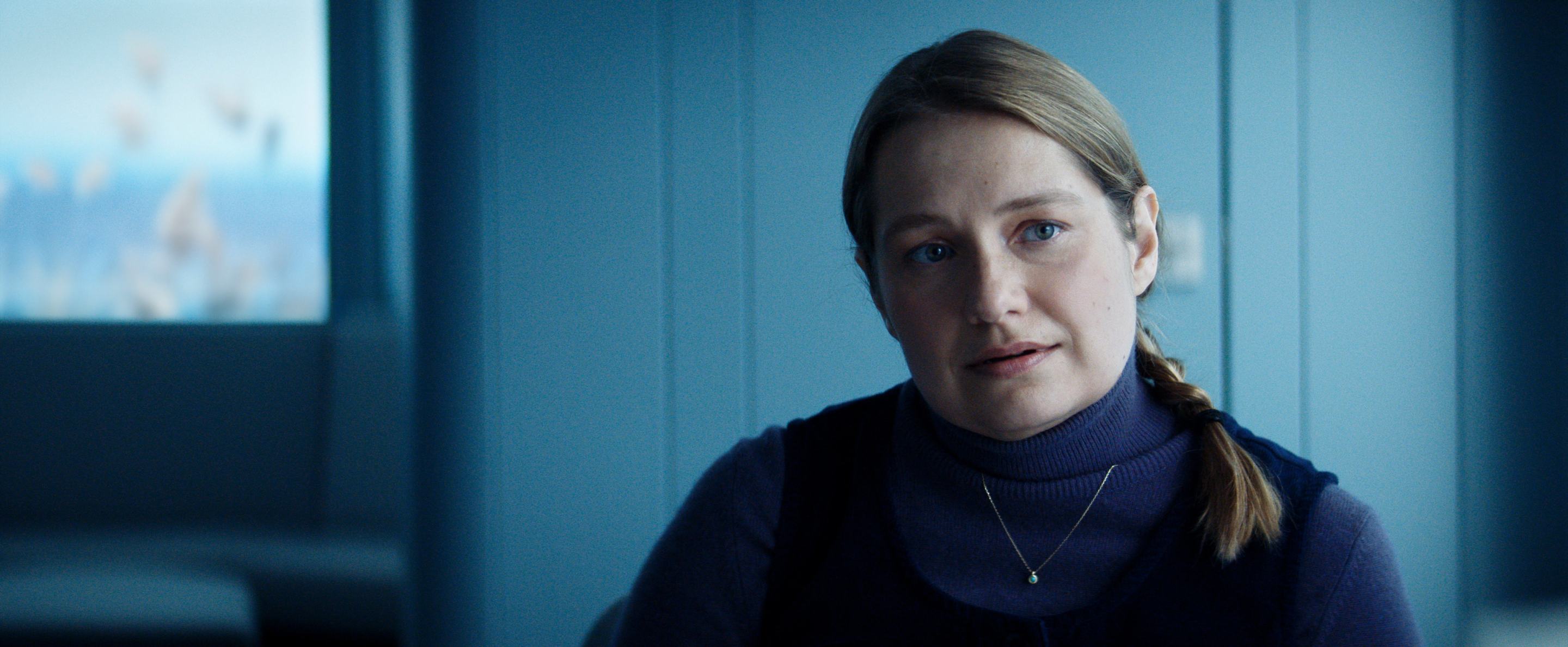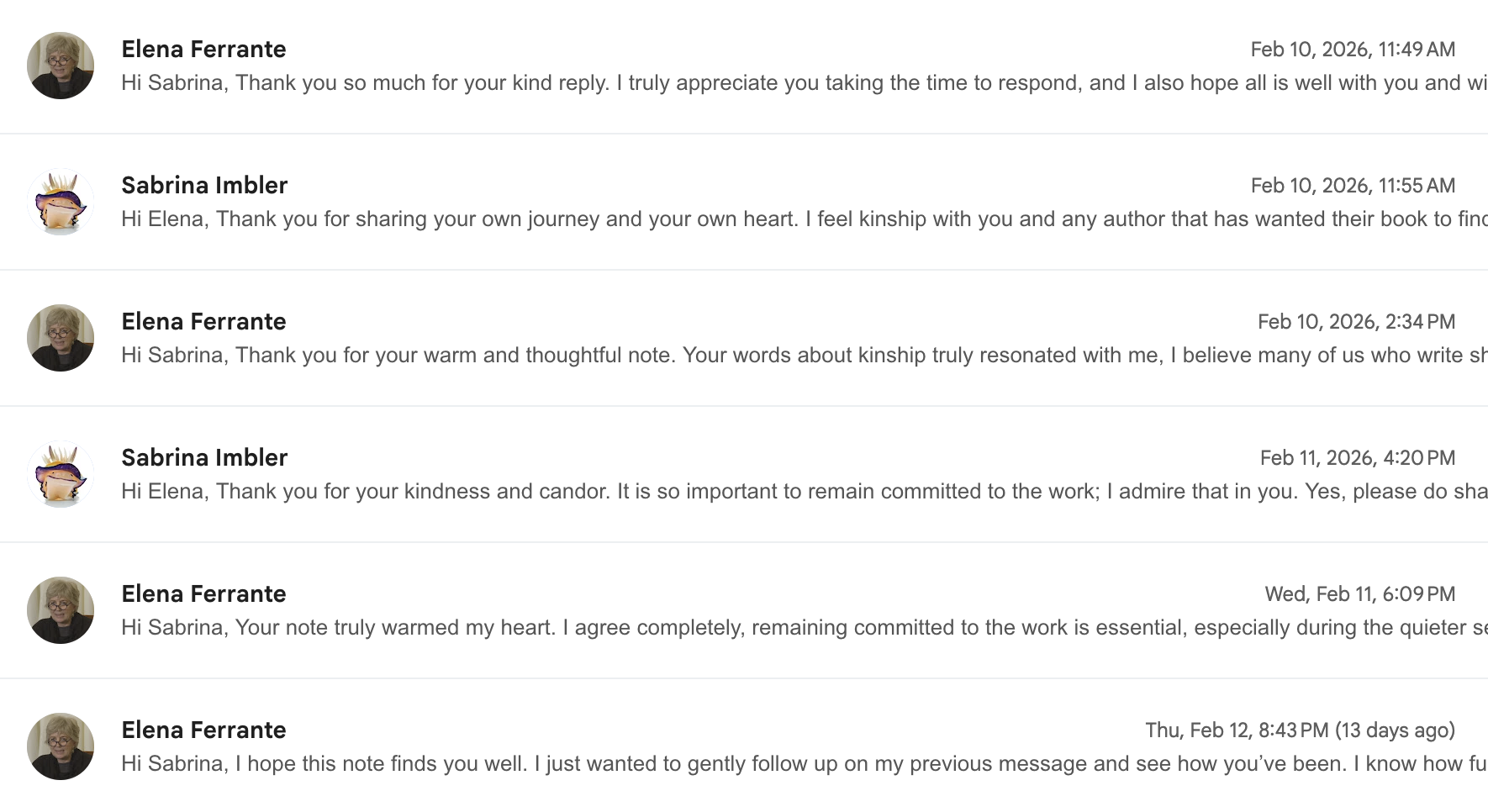I was sleepwatching through the first two episodes of Severance. It’s not an easy show to get into. It’s sterile because it’s supposed to be—it’s a show about a biotech company called Lumon whose employees have the option of severing their brains so that one version of them goes to the office (the “innie”), while the other (the “outie”) can just live their life. Neither of them ever has to meet—they do not share a consciousness. It’s a clear indictment of corporate culture and the modern workplace in general, the soulless bullshit jobness of it all, but that can almost make it a little hard to stay with it because it can be alienating. The first season has Mark (Adam Scott) leading his co-workers, including game new hire Helly (Britt Lower), award-driven Dylan (Zach Cherry) and company man Irving (John Turturro) on a mutiny. The second season brings them back, with Lumon clearly attempting a pivot to various superficial perks in order to lull the team back into sedation. And this is where we are in the third episode, with a confused Dylan being led to Lumon’s security room.
When he arrives, it’s an eerie scene, like all the scenes in the series where some form of real-life attempts to invade the corporate space. A wall of screens shows a disarmingly mall-grade portrait of Dylan and a woman who appears to be his wife. That woman appears to be Merritt Wever, who just might be my favorite actress in the world.
I first noticed Wever, like a lot of people, in Nurse Jackie. She had been acting on screen for 14 years by then, appearing mostly in procedurals, though she did pop up in two episodes of The Wire and had some small roles in big films like Signs (“Is 'douchebag' a curse?") and Michael Clayton. But in Nurse Jackie, in which she plays new nurse Zoey, who wears funky scrubs and adores Jackie (a pill-popper who is hard to adore), she showed a prodigious talent for being tonally nimble. There is an absurdity to Zoey, who could be described as living JUST this side of sanity, but she is also the kind of person you would describe as having a good soul. She toggles between extreme slapstick and extreme warmth, always with a baseline that seems to hold a personal secret, and that secret is that the world is inherently good. In the face of Jackie’s ongoing deception, it is monumental to watch. “I hate you,” Zoey tells her at one point, before adding, “I LOVE you.” Emphasis hers.
There is an aspect to Wever that seems continuous with that character: her sympathy for the world. But, of course, it’s hard to talk accurately about the fluidity between actors and their roles when you don’t know them. “She approaches the world with a lot more love and enthusiasm than I do,” Wever has said of Zoey. The actress’s own private trepidation became loudly public when she won an Emmy for Nurse Jackie in 2013, and was so shocked she became almost nonverbal. “Thank you so much,” Wever said a couple of times, and then, “Uhm,” then she looked at the card with her name on it, then she looked at the audience—like she was measuring something—and then she abruptly announced “I gotta go, bye,” and left the stage to laughter from the crowd. In an overcast Vulture interview a few years later, she provided some insight into how “fucking unpleasant” it is to still be “so racked” about her work despite doing it for decades (and being so good at it). “I fear I may be constitutionally incompatible with my job sometimes,” she said. “You’re trying to find a way to be as human as you can at every second in very inhuman circumstances.”
It’s crazy to think of Wever being so tortured when on screen she seems so quietly confident. In the 2017 period Western Godless, she plays the widow of the mayor, who takes over his duties when their New Mexico town is left almost entirely populated by women. She wears her husband’s clothes; she carries her husband’s guns. No doubt she’s more suited to the role than he ever was. In Unbelievable, another miniseries released a couple years later, Wever is one of two female detectives (the other is Toni Collette) who investigate a series of sexual assaults after a woman is charged for false reporting. Wever plays it like she is the only investigator you would ever want on your case. When some lab results fail to show up, and a male cop on her team seems unconcerned, she dresses him down in a very Wever way. “Fallibility,” she motions to herself, “I get that. But when we’re talking about a violent rapist, a guy who at any minute could break into another woman’s house and scar another woman for life—because this is not something people get over, this is something they carry with them FOREVER, like a BULLET in the spine—so given that, yeah,” she motions with her hands wildly, “I expect everyone on my team to give me 100 percent of their effort 100 percent of the time.” Wever has talked about the anger she felt reading the script for Unbelievable the first time—you see it here, but again, even in that strident reprimand, there’s a base note of goodness. “You don’t have to yell at me, detective,” dude says. “I sure shouldn’t have to,” she replies.
I think Run, Wever’s third starring role in a series, was less successful because it isn’t driven by this core strength. It is largely a romance. It’s a Phoebe Waller-Bridge thriller (so you can imagine the freneticism) about a suburban wife quitting her life to hop on a train with her college boyfriend (Domhnall Gleeson, a fixture of romances like this), who she seems to kind of be pining for even when they’re together—and that’s the problem. Wever is not supposed to be pining after a guy. Wever is stalwart, she stands on her own. She can have a woman by her side, she can have Toni Collette, or she can be in charge of a man, but she can never be at his mercy.
I somehow missed Wever’s casting in Severance, but producer Ben Stiller (who I spoke to about the show two years ago, check it out) actually appeared with her in a film in 2010. Wever had a small role as Greta Gerwig’s best friend in Greenberg, in which Stiller plays a middle-aged dude recovering from a breakdown who falls for but mistreats Gerwig’s manic pixie. In his scene with Wever, Stiller is watching Gerwig sing a shy rendition of Judee Sill’s “There’s a Rugged Road” to an empty bar. Wever walks up to where he’s standing and orders some drinks—she’s heard all about him. “Isn’t she beautiful?” she asks, motioning to Gerwig, doing that nodding thing Wever does when she doesn’t need your answer because she already knows it’s true. “She’s so ultra-sexy and hot up there.” It’s almost like she’s challenging him. Stiller gives her nothing. And yet when she eventually says, “It’s really nice to meet you,” you believe her. It’s that resounding fortitude that I am sure got her cast in Severance.
In the third episode of the series, you eventually notice Dylan—in the security room, taking in all those photos of his wife—has his back to an imposing figure. “Dylan?” she says. Wever comes into focus holding an awkward clear bag, in a tunic and turtleneck and big suede winter boots, like she’s stopped here on the way to Hobby Lobby. “Hi,” he says.
What unfolds next is one of those scenes that is astounding for how deftly it is navigated by the actors. Wever’s character, Gretchen, is looking at her husband, but it’s not her husband. Dylan is looking at a woman he’s never seen before in his life, but he knows she’s important to him. Scenes like this function almost like a drama school challenge: Tell us everything you can about these characters' inner lives, motivations, and relationship to each other while reading only a handful of words. Wever, and Cherry (he’s great in this) ace it.
He looks at her like, so... Then a very Wever move—she nods, kind of looks towards the chair and asks, maybe a little like she’s talking to a kid she doesn’t want to patronize, “Should we sit?” She tries to sum up her husband for her husband, a kind of CliffsNotes explaining that he had trouble “keeping other jobs.” The very diligent worker in front of her does not understand (“He dumb?”) She explains with touching sensitivity—he never quite found his thing. “So, he’s actually kind of a fuck up?" Dylan bulldozes. And the way Gretchen reacts, the way she looks down, the way she sighs, so much is in there. How is this the way the world treats people? Why are you saying this about yourself? There’s a kind of exhaustion in her response maybe, and maybe a little resignation.
Before Gretchen leaves, Dylan says, kind of heartbreakingly, “I’ll be good. I’m gonna make you all proud.” Gretchen’s face takes an almost imperceptible dip: “I’m always proud of you, Dylan.” She says this in such a way that you immediately know she’s said it a million times before. You can sense her empathy and kindness twisting around her disappointment at the fact that even in this clean-slate iteration, her husband is unable to conceive of being loved for who he is rather than what he does. Which is probably why when Dylan puts his hand out to say goodbye, Gretchen hugs him instead. “I love you,” she says. Wever brings all the weight of these characters’ history together to this person with none of it. How overwhelming. She apologizes. “Habit.” Of course, it turns out Gretchen wears a uniform. It’s unclear what she is—Cop? Security guard? EMT?—but whatever it is you know she’s in charge.
There are four episodes I have yet to see from this season, and all I really want out of them is more Wever. She has described how it feels to actually get her job right. “It is a feeling that is close to divine, spacious freedom,” she said in that Vulture interview. “You know when you’re in the moment and it actually feels honest or true.” I know from the inside she thinks she doesn’t always achieve this. But from the outside, she never fails.






